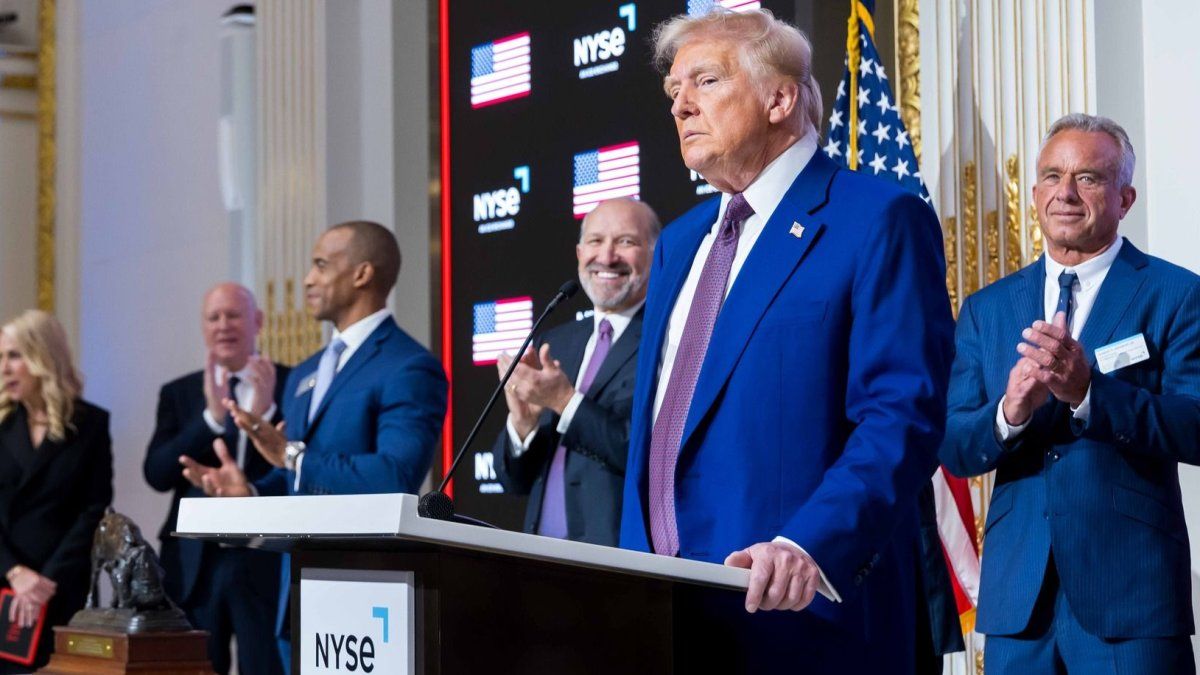American companies are on the maximum alert to the president’s plans Donald Trump, whose impact on trade, regulation and global financial system is generating uncertainty in markets. As Wall Street Analyze possible radical reforms, concern for measures that could affect from the approval of medicines to the import costs of key supplies grow.
In addition, according to the Bloomberg agency, rumors about a supposed “Mar-A-Lago Agreement” are capturing the attention of investors, feeding speculation about a possible restructuring of US debt.
Regulatory and commercial risks
Since Trump assumed his second term, companies have begun to include in their financial reports warnings about the risks that could be derived from their agenda. The administration has prioritized the implementation of tariffs, the control of government agencies and the reduction of the Federal Labor Force, generating questions about the future of several key sectors.
Giants such as Chipotle Mexican Grill Inc. (CMG) have alerted on the possible impact of tariffs on basic products such as avocados and limas, while Johnson & Johnson fears delays in the approval of medicines if the Food and Drug Administration (FDA) faces cuts Budgets American Airlines Group Inc. (AAL) has also expressed concerns about possible additional taxes in imported airplanes and spare parts.
The CVS Health Corp. (CVS) health company exemplifies the paradox of many firms: while its CEO David Joyner expressed optimism for dialogue with the White House, its annual report warns that regulatory uncertainty could affect its income if funds are reduced For Medicare.
The general feeling in the corporate world has gone from an initial optimism, based on promises of deregulation and tax cuts, to a growing concern for the costs that could be derived from Trump’s protectionist commercial policy. The imposition of tariffs could make key inputs for construction and manufacturing, affecting the profit margin of many companies.
The impact on the dollar and the financial system
One of the most discussed issues in financial circles is the future of the dollar under the Trump administration. An November 2024 report prepared by Stephen Miran, Trump’s economic advisor, raises a reform of global trade that seeks to reduce the “persistent overvaluation of the dollar”, which could have a significant impact on international markets.
The Jim Bianco strategist has warned its clients about a concept that has called the “Mar-A-Lago Agreement”, referring to the historic Agreements of Plaza (1985) and Bretton Woods (1944), which redefined the global financial system . According to Bianco, the Trump administration could force certain foreign US creditors to redeem their treasury bonds for ultra -term bonds, as a way of relieving the burden of national debt.
While Bianco considers that this measure is not imminent, he warns that the mere fact that this type of reform is discussed is a sign of the potential impact of the new administration on the global economy. If specified, the restructuring of US debt could affect the stability of the financial system and the perception of the dollar as safe assets.
The Wall Street response and companies
The markets have reacted cautiously to these developments. Companies such as General Motors Co. (GM) and Walmart Inc. (WMT) have avoided including the possible impact of tariffs on their profit forecasts, reflecting uncertainty on how Trump’s policies will evolve.
Meanwhile, Bloomberg analysts have pointed out that Trump’s strategy could seek to weaken the dollar in commercial terms, but strengthen it in financial markets. This would mean a paradigm shift in American monetary policy, which has traditionally favored a strong dollar.
Another area of concern is the effect of Trump policies on foreign investment and global trade. The possibility that the US adopts unilateral measures to reform trade has generated concern among the country’s main business partners. Although the White House argues that its objective is to improve the competitiveness of the American industry, commercial reprisals of other nations could generate volatility in markets.
Towards a new financial era?
The comparison of the alleged “Mar-A-Lago Agreement” with the 1985 Plaza Agreement is significant. At that time, the main economies of the world coordinated a devaluation of the dollar to correct commercial imbalances. However, on this occasion, the Trump administration seems focused on a unilateral strategy, which could generate tensions with traditional allies such as the European Union and Japan.
Jim Bianco has pointed out that, although debt restructuring is only a possibility, the White House approach to reduce the commercial deficit and the country’s debt load is clear. In this context, some of the ideas raised by Miran and other advisors could be transformed into concrete proposals in the coming months.
What is clear is that the Trump government is willing to make bold decisions in economic and financial matters. The reduction of debt weight, global trade restructuring and a possible reform of the monetary system could define the next years of the US economy and its impact on the world.
Uncertainty and opportunity
For US companies, the challenge in this new era will be to adapt quickly to regulatory and commercial changes. The growing uncertainty could translate into greater volatility in the markets, but also in opportunities for those companies that manage to anticipate the new rules of the game.
Wall Street, meanwhile, faces the challenge of interpreting the signs of the White House and preparing strategies for a possible redesign of the financial system. While the “Mar-A-Lago Agreement” is only a theory for now, the possibility of deep changes in Trump’s economic policy keeps investors in suspense.
As the next steps of the administration are defined, one thing is safe: the impact of Trump’s policies will continue to be a key factor in the direction of the global economy in the coming years.
Source: Ambito




